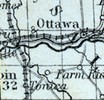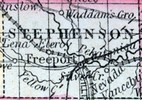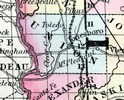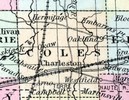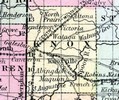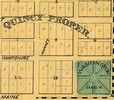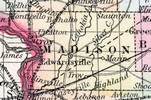Primary Sources
This page offers a gateway for easy access to the thousands of primary sources and historical records associated with the Lincoln-Douglas Debates that you can discover within the main House Divided Project database. Click on the icon for the Lincoln-Douglas research engine for a general overview of this major topic or click on one of the specific primary source collections for a more targeted introduction to key aspects of the dramatic 1858 contest.
 |
The Lincoln-Douglas Debates research engine includes hundreds of primary source documents, images, timeline entries, biographical sketches, place descriptions, note cards clipped from secondary sources, and a bibliography for further reading. |
|
The 1858 campaign was really a contest for control of the state legislature Ėnot a direct battle for the US senate seató and it involved a feud between fellow Democrats Stephen Douglas and President James Buchanan as much as the debates with Republicans. The contest was also quite rough at times. The documents in this collection illustrate these facts quite well, with various letters, recollections and articles describing the origins of the agreement over the “joint discussions,” the back-and-forth between Douglas and Buchanan, and even Lincolnís fears about fraudulent voters (see the Oct. 20 letter to Judd). There is also a newly discovered and previously unpublished letter by Lincoln, sent to Chicago Tribune editor Charles Ray on June 27, 1858 that contains fiery and seemingly very un-Lincolnian language.
 |
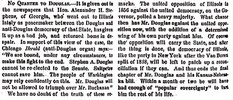 |
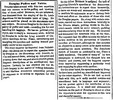 |
 |
 |
 |
 |
| New York Herald, July 30, 1858 |
New York Herald, August 30, 1858 |
Chicago (IL) Press and Tribune, September 20, 1858 |
Wentworth to Lincoln, April 19, 1858 |
Lincoln to Ray, June 27, 1858 |
Ray to Lincoln, July 1, 1858 |
Lincoln to Douglas, July 24, 1858 |
| |
 |
 |
 |
 |
 |
 |
|
| Ray to Lincoln, July 27, 1858 |
Douglas to Lincoln, July 30, 1858 |
Lincoln to Judd, October 20, 1858 |
Recollection by Henry Villard |
Recollection by John M. Palmer |
Recollection by Usher F. Linder |
|
This collection contains two newspaper reports, one from a southern Democratic point of view and the other an account from the New York Times; correspondence between Abraham Lincoln and Republican journalist John Locke Scripps discussing the impact of the event, and a reminiscence of the speech from the Congregationalist president of Illinois College, Julian Monson Sturdevant in 1896.
 |
 |
 |
 |
 |
| Chicago (IL) Press and Tribune, July 5, 1858 |
New York Times, June 21, 1858 |
Scripps to Lincoln, June 22, 1858 |
Lincoln to Scripps, June 23, 1858 |
Recollection by Julian M. Sturtevant |
This collection contains one account from the Democratic Chicago
Times, two from the Republican Chicago
Tribune, Lincoln’s correspondence with Joseph Cunningham, editor of the Republican Urbana (IL)
Union, and republican Indiana Representative Schuyler Colfax. Also included are recollections from journalist Henry Villard and J. K. Magic, who attended the Ottawa debate.
 |
 |
 |
 |
 |
 |
 |
| Chicago (IL) Times, August 22, 1858 |
Chicago (IL) Press and Tribune, August 23, 1858 |
Chicago (IL) Press and Tribune, September 1, 1858 |
Lincoln to Cunningham, August 22, 1858 |
Colfax to Lincoln, August 25, 1858 |
Recollection by Henry Villard |
Recollection by J.K. Magic |
This collection offers two accounts from Douglas supporting newspapers, both unflattering about Lincoln’s performance at Freeport, and two letters of advice and encouragement from his advisor Joseph Medill and his friend Lyman Trumbull following the debate. Also included are retrospective memories from Medill in 1895, Illinois Representative Elihu Washburne in 1885, and Henry Villard, a free soil journalist at the time, written in 1904.
 |
 |
 |
 |
 |
 |
 |
| Chicago (IL) Times, August 30, 1858 |
(St. Louis) Missouri Republican, 1858 |
Medill to Lincoln, August 27, 1858 |
Trumbull to Lincoln, September 14, 1858 |
Recollection by Elihu Washburne |
Recollection by Henry Villard |
Recollection by Joseph Medill |
This collection offers reports from two Chicago newspapers, the Republican
Tribune and Democratic
Times, as well as Lincoln’s correspondence with Methodist minister Martin Sweet and republican Illinois Representative Elihu Washburne. Also included is a recollection in 1914 from Horace White, a reporter for the Chicago Tribune during the campaign.
 |
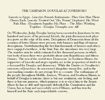 |
 |
 |
 |
| Chicago (IL) Press and Tribune, September 17, 1858 |
Chicago (IL) Times, September 17, 1858 |
Lincoln to Sweet, September 16, 1858 |
Lincoln to Washburne, September 16, 1858 |
Recollection by Horace White |
This collection provides reports from two Chicago newspapers, the Republican
Tribune and Democratic
Times, and a letter from supporter James Wright. Also included are retrospective memories from lawyer Henry Whitney in 1892 and Indiana state senator Lew Wallace in 1906.
 |
 |
 |
 |
 |
| Chicago (IL) Press and Tribune, September 21, 1858 |
Chicago (IL) Times, September 21, 1858 |
Wright to Lincoln, October 11, 1858 |
Recollection by Henry Clay Whitney |
Recollection by Lew Wallace |
This collection contains two newspaper accounts, one an editorial that requested organizers provide “adequate accommodations for reporters” and the other a report from a Democratic perspective published after the debate. Also included are recollections from two women who observed the debate.
 |
 |
 |
 |
| Chicago (IL) Press and Tribune, October 5, 1858 |
Galesburg (IL) Democrat, October 9, 1858 |
Recollection by Lydia A. Titus |
Recollection by Mary Hastie Boutelle |
Items from this collection help illustrate the partisan nature of the contest. Two articles from Republican journals celebrate Lincolnís performance and attack Democratic newspapers for intentionally mangling the debate transcripts. Meanwhile, the article from the Quincy Herald, a Democratic organ, repeatedly insults the “black republicans.” There are also competing recollections from two men who had been youthful supporters of the opposing candidates.
 |
 |
 |
 |
 |
| Quincy (IL) Whig, October 15, 1858 |
Chicago (IL) Press and Tribune, October 18, 1858 |
Quincy (IL) Herald, October 16, 1858 |
Recollection by Carl Schurz |
Recollection by David Patterson Dyer |
This collection offers several documents illustrating the complicated conclusion to the debate series in mid-October. The newspaper accounts detail how attendance had dipped at Alton perhaps because of exhaustion but the New York Evening Post article captures well how the contest had neverthless “attracted the attention of the whole country.” The letter from Lincoln advisor David Davis also demonstrates how the campaign continued after the seven “joint discussions.” Three vivid reminiscences round out the collection offering colorful details of the scene at the final 1858 debate.
 |
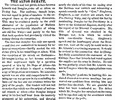 |
 |
 |
 |
 |
 |
| Chicago (IL) Times, October 17, 1858 |
Chicago (IL) Press and Tribune, October 18, 1858 |
New York Evening Post, October 20, 1858 |
Davis to Lincoln, September 25, 1858 |
Recollection by Edmond Beall |
Recollection by Gustave Koerner |
Recollection by Jeriah Bonham |
The documents in this collection illustrate how the results of the 1858 elections confirmed two seemingly contradictory lessons --first, Douglas had scored a stunning personal triumph after a year of feuding with a president from his own party and in a state that was leaning Republican, yet nonetheless Lincoln had also emerged from the contest with an enhanced standing both in Illinois and across the nation. Contrary to popular myth, Lincoln was not at all depressed by the results, as the letters in this collection clearly indicate. "The question is not half settled," he wrote (To Eleazar Paine, Nov. 20). The Republican Party was rising and he was one of its pivotal leaders. During the year following the debates, Lincoln gave political speeches in several northern states and by December 20, 1859 (see letter to Fell), he was even responding to requests for biographical material from a Pennsylvania newspaper profiling the leading presidential contenders in the upcoming 1860 contest.
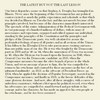 |
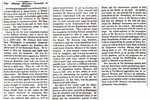 |
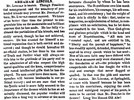 |
 |
 |
 |
 |
| Philadelphia (PA) Press, November 4, 1858 |
New York Times, November 5, 1858 |
Chicago (IL) Press and Tribune, November 10, 1858 |
White to Lincoln, November 5, 1858 |
Davis to Lincoln, November 7, 1858 |
Lincoln to Judd, November 15, 1858 |
Lincoln to Judd, November 16, 1858 |
| |
 |
 |
 |
 |
 |
 |
|
| Lincoln to Paine, November 19, 1858 |
Lincoln to Asbury, November 19, 1858 |
Lincoln to Ray, November 20, 1858 |
Lincoln to Trumbull, December 11, 1858 |
Lincoln to Fell, December 20, 1859 |
Recollection by Gustave Koerner |
|


